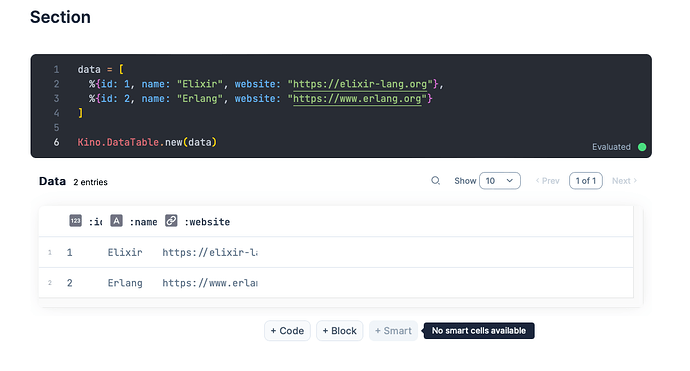As I’ve mentioned before, I’m in the middle of setting up a Livebook instance connected to our main application runtime to allow scripting/reuse of administrative tasks we currently do via iex -remsh.
The first step has been a success: I’ve successfully connected a Livebook instance to my running application, and I’m able to do a whole lot of what I set out to do by loading and running livemd files.
Taking things a bit further: By adding kino as a dependency to my application, I am able to render Smart Cells in the Livebook. What I haven’t figured out yet is if there’s a way to configure my application so users can add Smart Cells to a notebook via Livebook’s interactive editor.
For example:
What kind of introspection/query is Livebook using to determine what Smart Cells it can insert, and is there a way I can get my application to provide that info the same way the empty/default Elixir Livebook runtime does?
2 Likes
Smart cells usually come from packages and they are registered, here is an example from :kino_vega_lite. So to make the smart cells available in attached runtime you would need to have the corresponding packages as dependencies in your application. That’s why it’s oftentimes a better idea to use the default standalone runtime, connect to the app node and run things on that node using :erpc, while having the ability to install any visualisation packages or smart cells in the notebook, without clobbering app dependencies : )
1 Like
I’d love to go the RPC route, but I’m trying to figure out how to do that and still have my livebook notebooks written using what looks like vernacular Elixir. Using a simple Ecto example, I want to be able to write
alias MyApp.Data.Schemas.Foo
alias MyApp.Repo
Foo |> Repo.aggregate(:count)
but with :gen_rpc, I’ve only been able to call it as:
alias MyApp.Data.Schemas.Foo
alias MyApp.Repo
:gen_rpc.call(:"myapp@127.0.0.1", Repo, :aggregate, [Foo, :count])
I can’t figure out at all how I would write anything that uses macros.
I really want all the richness and syntax of Elixir with the flexibility of RPC. Do you know if that’s possible?
Yeah that’s the tradeoff of using RPC calls, if you need to use the remote modules heavily it’s a bit awkward.
I can imagine some helper would make it feel more readable, here’s a quick example:
defmodule DistUtils do
def connect_remote(node, cookie) do
Node.set_cookie(node, cookie)
Node.connect(node)
:persistent_term.put(:remote_node, node)
end
defmacro remotely!(fun) do
quote bind_quoted: [fun: fun] do
node = :persistent_term.get(:remote_node)
myself = self()
ref = make_ref()
{pid, monitor_ref} =
Node.spawn_monitor(node, fn ->
result = fun.()
send(myself, {:result, ref, result})
end)
receive do
{:result, ^ref, result} ->
result
{:DOWN, ^monitor_ref, :process, ^pid, reason} ->
raise "failed with reason: #{inspect(reason)}"
end
end
end
end
Then connect with
require DistUtils
DistUtils.connect_remote(node, cookie)
and run code on the remote node:
DistUtils.remotely!(fn ->
Foo |> Repo.aggregate(:count)
end)
(@josevalim if that solution is not sane let me know, or if you have any other ideas : D)
3 Likes
That’s actually kind of the solution I was thinking of. I’m going to experiment with it a bit unless/until Jose pops in and says it’s a terrible idea. 
This is actually working great. Thanks so much for the example!
Maybe it’s time for me to play with creating an RPC Smart Cell…
2 Likes
@mbklein there is actually :erpc.call, so there’s no much need for the macro:
:erpc.call(node, fn ->
Foo.foo()
end)
A smart cell could make it more approachable! The only factor is that the smart cell editor won’t have the regular intellisense (not much issue for modules, since they are likely only available on the remote node anyway, but relevant when using built-in functions).
2 Likes























